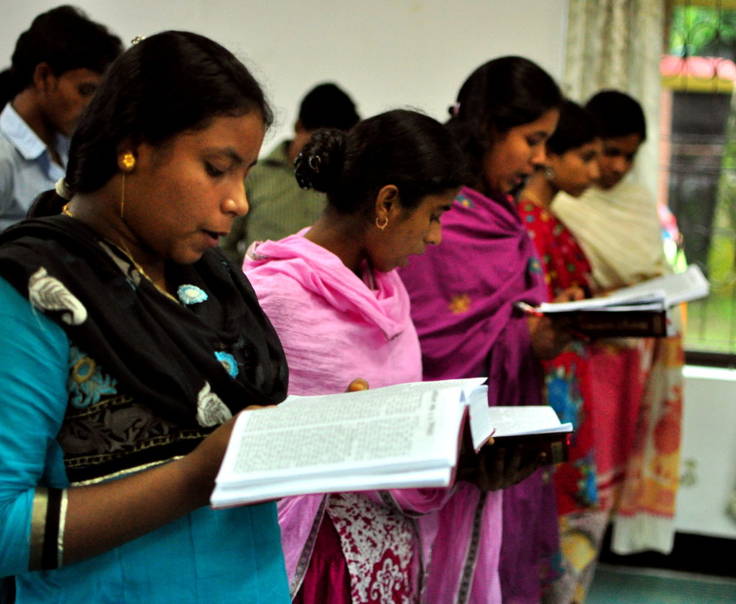Politics
/
December 8, 2023
Kate Cox, whose fetus is fatally diseased and threatening her life, had to ask a Texas judge to allow her to terminate her pregnancy. The judge agreed.

Kate Cox, who won the right to have an abortion in Texas.
(Courtesy of Kate Cox and the Center for Reproductive Rights)
On Thursday morning, in a Texas courthouse, something happened in America that is not believed to have happened since Roe v. Wade was decided in 1973: A judge issued a ruling on whether or not an actively pregnant person was allowed to get an emergency abortion.
Kate Cox, a 31-year-old Dallas mother of two, had asked the Travis County District Court to let her terminate a fatally diseased fetus that doctors had told her was threatening her life and her potential ability to have children in the future.
Travis County District Court Judge Maya Guerra Gamble immediately ruled from the bench following just under an hour of arguments, granting Cox a temporary restraining order that allows for an abortion and protects her physician from civil and criminal prosecution. “The idea that Ms. Cox wants so desperately to be a parent and this law may have her lose that ability is shocking and would be a genuine miscarriage of justice,” Gamble said.
The historic plea is indicative of the dire—and painfully desperate—circumstances vulnerable pregnant patients living under draconian abortion laws face post-Roe. This is Texas, and America, in 2023.
Cox and her husband Justin were overjoyed when they learned in August that she was pregnant with their third child. However, their excitement began to fade by October after blood tests indicated a possible complication in her pregnancy. Over the next five weeks, her fetus’ prognosis worsened. Ultrasounds revealed multiple serious conditions, including a twisted spine, a neural tube defect, a clubbed foot, and irregular heart and skull development. On November 28, Cox received the devastating official diagnosis that her third child suffered from Trisomy 18, a rare fatal chromosomal condition. Her doctors informed her that there was a high chance that her baby would die in utero or be stillborn—and that even if the child made it into the world, it would only live for a few days at most.
Cox’s own health and future fertility were also now in jeopardy. Within one month, Cox visited the emergency room four times for severe cramping and other painful symptoms. She was at risk for gestational hypertension and diabetes as well as infections; continuing her pregnancy posed a threat to her life. And the options she had were limited. Doctors could induce labor, but due to her prior C-sections, the procedure would likely result in a higher risk of rupturing her uterus, preventing her from getting pregnant again.
The safest and best option, doctors told her, was a dilation and evacuation, or D&E, abortion—but because of Texas’s hyper-restrictive abortion laws, this was not possible. Neither Texas’s Senate Bill 8—a near-total ban enforced by private citizens—nor the state’s criminal “trigger ban” which took effect after the Supreme Court’s Dobbs ruling contain carve-outs for fatal fetal abnormality. SB8’s medical emergency exception, classified as “risk of death or a substantial impairment of a major bodily function,” is so ambiguous and confusing for Texas physicians and hospitals that many are erring on the side of extreme caution, allowing patients to approach the brink of death before allowing pregnancy termination—or simply not performing abortions at all. Compounding the fear and uncertainty for doctors is the threat of punitive consequences for violating the law, including up to life in prison.
Lost, terrified for her health, and feeling dire urgency to get help, Cox learned that the Center for Reproductive Rights (CRR) had been pursuing a landmark lawsuit against the state’s abortion bans called Zurawski v. State of Texas. She discovered this on the very day she received the lethal fetal diagnosis—a stroke of “fortuitous” timing, court documents note.
After reading about the case, Cox reached out to the CRR and—racing against the clock as her health deteriorated by the minute— attorneys filed an emergency motion in state district court on Tuesday to allow Cox to receive a timely abortion from Houston ob-gyn Dr. Damla Karsan, who also serves as a plaintiff in their larger suit.
“It is not a matter of if I will have to say goodbye to my baby, but when. I do not want to continue the pain and suffering that has plagued this pregnancy,” Cox said in the filing. “I do not want to put my body through the risks of continuing this pregnancy. I do not want my baby to arrive in this world only to watch her suffer a heart attack or suffocation. I need to end my pregnancy now so that I have the best chance for my health and a future pregnancy.”
Just last week, in a hearing for the Zurawski case, lawyers with the CRR argued before the Texas Supreme Court in an effort to gain much-needed clarity on those vague and troubling emergency medical exceptions found in state abortion law. Two ob-gyns and, as of today, 20 women denied abortion care in Texas while experiencing “severe and dangerous pregnancy complications” are asking the court to clarify what qualifies as a medical exception. “No one knows what it means, and the state won’t tell us,” Molly Duane, an attorney with CRR, said during the arguments.
Women have shared their near-death and harrowing stories on the stand, including almost dying from sepsis and being forced to give birth to a non-viable fetus, only to watch their baby slowly die in their arms. In a show of circular logic, the state of Texas has continually deflected blame from the law’s dangerously vague nature onto the actions of individual physicians who are interpreting the text.
While a district court judge ruled in August that Texans facing these high-risk pregnancies can access life-saving abortion care following an emotional and intense two-day trial in her Austin courtroom, the state government swiftly appealed the ruling to the all-Republican state Supreme Court, immediately blocking the injunction until the higher court decides what to do. Attorneys expect a ruling sometime before June.
Popular
“swipe left below to view more authors”Swipe →
In a press call with reporters on Thursday, attorneys with CRR underscored the glaring contradictions in the state’s arguments from one week to the next, laying bare their true intentions—to halt abortion care, no matter the situation, at all costs. During arguments before the Texas Supreme Court, Assistant Attorney General Beth Klusmann conceded that a patient actively seeking an abortion for a lethal fetal anomaly could, in fact, have standing to sue the state for her individual case, though she noted the “impracticality” of a woman’s having to find the time and space to do so while undergoing such circumstances. But when Cox, the exact kind of patient Klusmann had been discussing, materialized just days later, her situation didn’t merit intervention in the state’s eyes; rather, it was regarded by Texas attorneys as a “frivolous assertion of harm.” Johnathan Stone, a lawyer with the Texas attorney general’s office, argued that Cox would not suffer “immediate and irreparable injury,” despite the stream of clear medical harm already incurred, not to mention the bodily dangers to be faced without immediate abortion care. In fact, Stone argued it was the state that would suffer greater harm.
“The state’s arguments are, frankly, stunning,” Duane said in the press call. “They have contradicted what they said at the Texas Supreme Court and in doing so, revealed their true position all along: Only when a woman is about to die—or even when it’s too late—can abortion be allowed in the state of Texas. In other words, these medical exceptions are no real exception at all.”
Underscoring what plaintiff attorneys have continually described as the “callousness” in which the state has fought to keep abortion out of reach, zealously anti-abortion Texas Attorney General Ken Paxton, issued a statement following the ruling threatening prosecution of anyone involved in Cox’s abortion, including her physician and the hospitals she works for. The judge’s order would not “insulate hospitals, doctors, or anyone else, from civil and criminal liability for violating Texas’ abortion laws,” he claimed.
Paxton’s warnings have been condemned by the National Association of Criminal Defense Lawyers, which considers his call to override the judge’s order not only an “intimidation” tactic but a violation of the TRO and possible grounds for an ethics complaint related to an abuse of power. (Paxton was recently mired in a lengthy impeachment trial for several counts of corruption and abuse of office, but was eventually acquitted by the ultraconservative Texas Senate.)
While Judge Guerra Gamble provided a (very) rare victory in the battle for reproductive rights in Texas, the ruling notably fails to assure future wins. In this case, attorneys representing the patient benefited from a judge elected on the Democratic Party line; however, that may not be the case next time. Furthermore, absent a ruling in favor of abortion rights in Zurawski v. State of Texas, the question remains: Will every individual pregnant person undergoing a dangerous, high-risk, or potentially life-threatening pregnancy need to take the extraordinary step of filing an emergency lawsuit for abortion care?
During the press call on Thursday, Duane stressed how “unforgivable” and “cruel” it is for Texas to have created an environment in which a suffering pregnant patient must ‘“beg” for healthcare in court. “No one should have to do this, and the reality is that 99 percent of people cannot,” she said.
Some are simply struggling to survive in Texas ICUs, unable to mount such an ambitious challenge, and will be forced to continue pregnancies that put their lives at risk. Cox’s story is truly one of rare circumstance, as a confluence of events—including the precise timing in which she happened to learn about the CRR lawsuit—contributed to the victory. Most Texans will not be so fortunate, attorneys said.
“What is happening in Texas is a human rights violation,” said Duane. “I ask you to think about all the people that need abortion right now that cannot drop everything to file a lawsuit. It is completely absurd…. The state of Texas has showed that they don’t care whether people live or die—as long they are forced to give birth.”
Mary Tuma
Mary Tuma is a Texas-based freelance journalist who covers reproductive rights. Her reporting has appeared in The Guardian, Vice, The New York Times, the Texas Observer, Rewire News Group, The Austin Chronicle, The Progressive, Ms., HuffPost, Salon, and others.
Note: This article have been indexed to our site. We do not claim legitimacy, ownership or copyright of any of the content above. To see the article at original source Click Here














